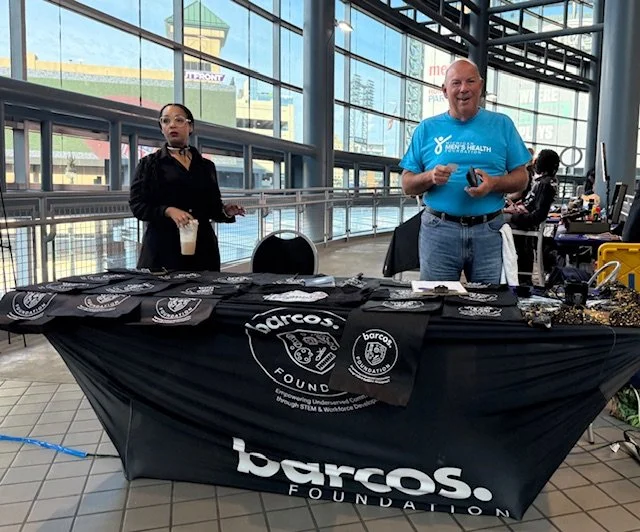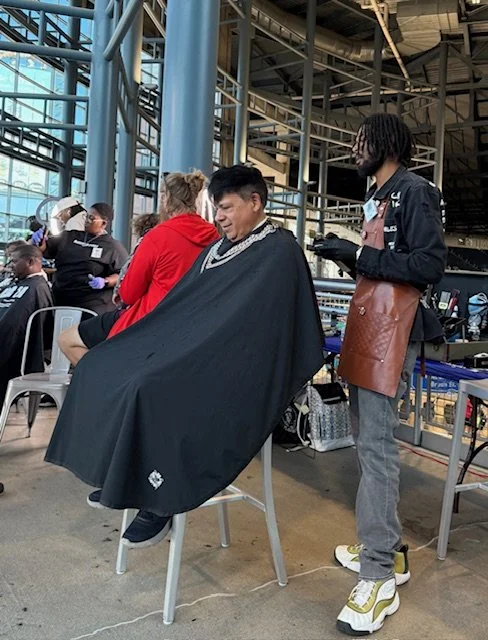Barcos Q3 Report: Four Lessons in Community, Kindness, and STEM from an Unlikely Michigan Movement
1.0 Introduction: Beyond the Barbershop Chair
The local barbershop or salon often holds a special place in our communities. It’s a familiar hub of conversation and connection, a place where people from all walks of life can sit back, relax, and leave feeling a little bit sharper, a little more confident. It's a cornerstone of main street, a simple and timeless part of neighborhood life.
But behind the familiar buzz of clippers in Michigan, a deeper story is unfolding—one of surprising regulatory hurdles, unexpected innovation, and data-driven community action. At the center of this story is the Barcos Foundation, an organization that is not only addressing the crisis in the state's barbering industry following the closure of key institutions like the Michigan Barber School, but is also teaching powerful lessons about where to find opportunity, how to measure impact, and why STEM skills matter in places you'd never expect.
2.0 Takeaway 1: Michigan Barbers Need More Training Than Airline Pilots
When you think of professions with demanding training requirements, you probably picture doctors, lawyers, or airline pilots. You probably don’t think of the person who cuts your hair. But in Michigan, the reality of occupational licensing presents a startling contrast.
"Barbers in Michigan need more training hours than airline pilots need for their federal license."
But this isn't just a quirky piece of trivia—it's a stark indicator of a deeper problem. This regulatory disconnect, where a state-level barber license demands more hours than a federal pilot’s license, perfectly illustrates the kind of illogical barriers that can prevent skilled professionals from entering and thriving in their chosen fields. Across Michigan, 175 different occupations require a license to work, affecting roughly one in five workers. It’s this kind of challenge that fuels the Barcos Foundation’s legislative advocacy, as they fight to bring common sense to the rules that govern essential professions.
3.0 Takeaway 2: The Unlikely—But Powerful—Intersection of STEM and Haircare
The Barcos Foundation is committed to empowering underrepresented communities through education and workforce development, creating equitable opportunities in high-demand careers. Their primary focus is STEM (Science, Technology, Engineering, and Math), and they’ve seen incredible success in traditional tech pathways. One young woman they mentored, Maria Payton, is now a software engineer; another student, Robert Matthew, secured a high-paying job in the technology industry through their apprenticeship program.
But what makes their work truly innovative is how they expand the very definition of a STEM career. They are actively bringing STEM education into “nontraditional fields,” and their most surprising application is in the hair industry. Take the story of Jamie Kokot. A former cosmetology student, Jamie integrated STEM skills into her profession to launch a successful salon built around “science-driven haircare solutions.” By treating haircare as a field rooted in chemistry, biology, and material science, the foundation breaks down stereotypes and builds new, accessible pathways for individuals who might never have pictured themselves in a lab coat but possess the talent and curiosity to excel.
4.0 Takeaway 3: A Single Event Can Generate Thousands of Dollars in Community Value
Community service events are often seen as feel-good moments, but their true impact can be hard to measure. The Barcos Foundation took a different approach with its "Team Waymaster" initiative, an event at Ford Field honoring the legacy of Chris Waymaster. It was a masterclass in how a grassroots initiative can be executed with corporate-level strategic precision.
Barcos Foundation’s Digital Analytic Dashboard
The results speak for themselves:
Volunteers: 9 licensed barbers and additional support staff
Services Provided: 200 free haircuts
Future Value: Over $2,000 worth of free services pledged for the future
This wasn’t just a day of free haircuts; it was a highly sophisticated, multi-partner operation. With each volunteer dedicating over a month to coordination, the foundation built a powerful coalition that included key partners like the Office of Mary Sheffield, Legacy Barber College, and Michigan Men's Health. Afterward, they proved their value through a robust communications strategy that included a formal press release, social media campaigns, and feedback forms for volunteers and customers. This data-driven approach transforms a simple act of service into a powerful proof of concept, demonstrating that grassroots community action can be run with the strategic foresight needed to attract major partners and create lasting value.
5.0 Takeaway 4: Kindness Can Be a Trackable Metric
How do you measure something as abstract as kindness? The Barcos Foundation has an answer. Inspired by the World Kindness Movement, they created the "Kindness Jar" and the "Kindness Impact Tracker." This isn't just a suggestion box; it’s a dedicated system designed to be a "vibrant hub to celebrate, encourage, and visualize acts of kindness."
Through this tracker and the related "STEMming from Kindness" initiative, the foundation reframes kindness as something more than a passive virtue. Instead, it becomes a series of deliberate, observable actions that can be acknowledged, shared, and analyzed. This unique approach transforms an abstract concept into an active, strategic tool for building a more positive and supportive community, proving that even our best human impulses can be fostered with intention and focus.
6.0 Conclusion: Finding Opportunity in Unexpected Places
From legislative advocacy and non-traditional STEM education to data-driven charity and kindness tracking, the work of the Barcos Foundation offers a powerful lesson: meaningful innovation and profound community impact often arise from the most unexpected places. It shows that with the right vision, even a familiar neighborhood institution can become a center for progress.
The Barcos Foundation proves that data-driven compassion and scientific rigor aren't just for boardrooms and laboratories. It leaves us with a critical question: What hidden potential in our own neighborhoods will we unlock when we start looking for it?















































